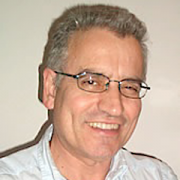I was born in 1951, in Barcelona, Catalonia, Spain; so my ethnic background is Catalan. My father sent his six children to the Lycée Français; the French school of Barcelona, one of the few non-religious based schools in the city at that time. There, my first name, Joan –John in English- was translated into French as Jean. (The Lycée Français, in an effort to assimilate its students into French culture, assigned French first names to all of them.)
Considering that under Franco’s dictatorship, which I had to endure throughout my school years, and until 1975, Catalan was a forbidden language, even for first names, so my official name had to be registered as Juan, the Spanish version. Accordingly, a single vocal change in my name was the cause of my first cultural shock; at a very early age and throughout my childhood and through much of my teenage years. This made me precociously acquainted with cultural struggle.
Joan/Jean/Juan grew up feeling that being a member of a minority group was not easy. First of all, my own language, Catalan, even if spoken by about ten million people, was not very useful outside the Catalan borders. Therefore, learning other languages was highly recommended. Second, as Catalan identity was diluted into a global Spanish identity in the eyes of foreign people, I realized that we Catalans had to work hard to make our voices heard on the international scene.
In keeping with the peaceful traditions of Catalonia, Catalans believe that this recognition should come not from bombing or terrorizing, but from art, culture, science, gastronomy or sport. (Travelling around the world, you soon realize that the most famous thing people identify as Catalan is the football/soccer team from Barcelona).
Besides these comments about Catalan ethnic awareness, I must say that as a child I was fascinated by books about travellers and explorers and books of what was called “human races”. I dreamt about becoming an explorer in Africa and discovering unknown tribes.
So, it should come as no surprise that in my third year of medical school at Barcelona University, I decided to begin to study cultural anthropology at the same time as medical subjects. In 1974 I finished my medical studies and began my residency in psychiatry. In 1975, I completed my doctoral degree in cultural anthropology, so I was obviously committed to becoming a transcultural psychiatrist –although I didn’t really know at that time what that might involve.
In the summer of 1970, I had the opportunity to drive from Barcelona to Rawalpindi (Pakistan) and back, along with four other medical students. Driving across Europe, Turkey, Iran, Afghanistan and Pakistan was a great experience –though probably not a very safe one to repeat nowadays- and a good way to encounter people of very diverse cultures.
Later, during my training as a psychiatrist, I spent a year and a half in different centers in the United States, getting to know something about the diverse American society; quite an experience. In 1976, in San Francisco, at the Biological Psychiatry Association Congress (!), through some common friends, I happened to meet Wolfgang Jilek and Louise Jilek-Aall.
Until then, all my knowledge of cultural psychiatry had been acquired through books. I remember scrolling through the French “Encyclopédie Médico-Chirurgicale” and discovering articles on ethnopsychiatry by Wittkower and by Ellenberger that I was very excited by. But now, in 1976, in San Francisco, for the first time I met a couple of real, working transcultural psychiatrists! I was delighted, especially because Wolfgang and Louise offered their friendship to me and began to send me many of their publications. Since then, they have been a model for me and the natural way to introduce me into this impassioned world of transcultural psychiatry.
It was also through Dr Jilek that I would later become a member of the Transcultural Psychiatry Section.
Upon my return to Barcelona at the end of 1977, as an associate professor at the Psychiatry Department of the Medical School I took the initiative to begin teaching some seminars on this new discipline called transcultural psychiatry. It was probably the first time this topic was taught at a Spanish university.
In the 1980s and ‘90s, I continued to include this subject matter in post-graduate courses. Since at that time there were really only a few colleagues in the Spanish psychiatric scene interested in cultural psychiatry, I jokingly defined ourselves as a sect. Fortunately, our numbers have been growing steadily since then and there is now a much wider interest in Spain in cultural aspects of psychiatry.
In the summer of 1992, I had the chance, beyond the travels I had made in many countries, to do real fieldwork, in collaboration with a team of anthropologists in Ecuador. Modified states of consciousness have been one of my topics of interest, and I had the opportunity to observe the use of hallucinogenic compounds among the Shuar people of the Upper Amazon region of Ecuador.
I continued my involvement in transcultural psychiatry as a staff psychiatrist and professor at the University Hospital of Barcelona, doing research on traditional healers, until 1998.
In 1998 I was appointed as Director of the Mental Health Services of the Principality of Andorra. This is a unique country, a very small one, with only 76,000 inhabitants, 200 kilometers north of Barcelona, in the midst of the Pyrenees mountains. For me, it was going back to my family roots, as my father and my grand- father were of Andorran origin. It was also a great opportunity to develop some culturally sensitive services, given my position, in a country where 70% of the population are immigrants.
In 2001, Goffredo Bartocci, Chairman of the TP Section at that time, and a good friend since I had met him in Rome some years before, asked me if I was willing to organize the annual conference of the Section in Andorra. I was willing and I did it, though I still don’t know how. I’m very happy now about this decision, as I was able to host a magnificent group of transcultural psychiatrists, whose contributions signified a great scientific event for Andorra.
I also feel happy after these years of travelling around, getting to know so many colleagues; many of whom I greatly admire, and participating in the friendly atmosphere that has been a characteristic of transcultural meetings.
I have been a member of the (executive) Committee of the Transcultural Section since 2002. As the recently elected Secretary of the Transcultural Psychiatry Section of the WPA, I feel highly honoured and willing to pledge the best of my efforts to contribute to the strengthening of the Section and to the growth of our discipline.
April 5, 2006

